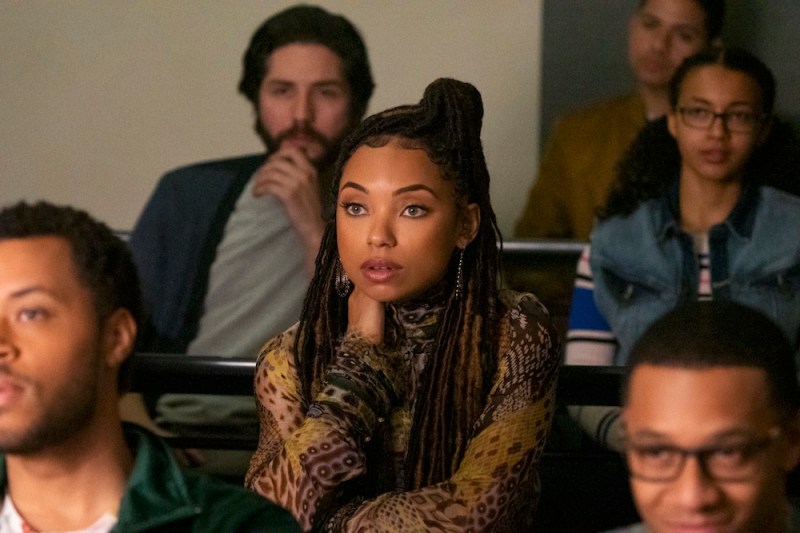“Dear White People” shifts in tone and aesthetic in season three. The series began with an implosion of racial tensions at Winchester University, a predominantly white Ivy League school, after a blackface party.
Since the beginning, the series has followed a group of students of color as they navigate the struggles of being a minority at an Ivy League university. While institutional inequalities facing the group were highlighted in previous seasons, season three focuses more on each character’s personal journey of self-realization.
If you haven’t seen the first two seasons of the show, beware spoilers below.
Season three begins with a bombshell discovery. Samantha White (Logan Browning) and Lionel Higgins (DeRon Horton) find the secret headquarters of the Order of X along with the cryptic narrator (Giancarlo Esposito) from seasons one and two. However, the scene becomes anticlimactic as Sam and Lionel storm out of the room when they refuse to solve another riddle. The previous year, Sam was the victim of an alt-right internet troll who was also Lionel’s boyfriend. So, understandably, the two are skeptic of the Order.
After their first run-in with the Order, the show shifts away from an external view of the community of Black Caucus and toward each student’s internal struggle instead. Sam hands her controversial radio show over to her best friend Joelle (Ashley Blaine Featherson), giving her more time to focus on her student film. Browning does an excellent job portraying a lost college student, but Sam’s character arc is somewhat stalled. She is no longer the passionate activist that she once was; her personality is almost the exact opposite of that previously portrayed.
At the end of season two, Sam meets Rikki Carter (Tessa Thompson), a famous conservative pundit. Rikki gets under Sam’s skin when she compliments Sam’s “character” on her radio show, implying Sam’s opinions are part of an act to gain celebrity.
Sam’s new lack of confidence and self-assuredness, her trademark characteristic, stems from the fact that she is afraid of turning into Rikki. This fear of the insincerity that comes with fame is amplified when she receives a disappointing lack of support from her idol, Cynthia Fray (Laverne Cox).
The show’s customary humor is often lost as Sam is in search of purpose outside of her radio show and activism. The provocative quips that brought internalized racism and cultural differences to light are now scarce to none. Thus, the show turns to the familiar trope of a sassy gay friend, D’unte, who carries the season with comic relief.
However, the satirical nature of the show holds up throughout the third season, as it did in the first two. The season’s parodies on “The Handmaid’s Tale” and “Queer Eye” provide brief comic relief while making us second guess some themes of popular TV shows. Also, they provide for sources of procrastination to an increasingly unmotivated Sam.
Though season three is less forthright than others with its takes on the impact of race on everyday life, the topics are no less substantial. For example, an activist and software engineer, Moses Brown (Blair Underwood), mentors Reggie, who has been suffering from PTSD since he was threatened by a campus security guard. Reggie, played by Marque Richardson, grows dependent on Brown and his new self-help app, distancing himself from his friends and girlfriend, Joelle. When Brown is accused of sexual assault, Reggie has trouble coming to terms with the potential for both good and bad within a person, and he refuses to accept the rumors. The dynamic offers perspective on the #MeToo movement.
“When we hear things about Michael, or Bill Cosby, or R. Kelly or whatever, it’s not just a bummer because we love them in an entertainment way. It’s a bummer because they’re the reason why we’re here sometimes. And I have to show that,” director Justin Simien told Vanity Fair.
Other weighty topics in season three include white feminism, lack of equal representation and black LGBTQ+ communities.
Lionel is finally comfortable in his own skin and decides to become an active member in Winchester’s gay community. He is a black sheep at first, but he later falls in love with Michael, and the two easily become Winchester’s least problematic couple.
On the other hand, Troy, now having more freedom after deciding not to pursue campus politics, becomes the only African American writing for the satirical publication Pastiche. His article mocking those opposed to Affirmative Action becomes completely misconstrued by the executive editor, making him appear anti-Affirmative Action and causing him to receive death glares from his fellow Black Caucus members.
The writers even poke fun at presidential candidate Elizabeth Warren, who infamously claimed she was Native American, despite being a white woman.
“Dear White People” does a marvelous job of switching between points of view and providing new perspectives of the characters. However, this season, grappling with one’s own identity is common throughout all the episodes and each character’s internal struggle. In an interview with The Daily in 2014, Simien spoke about his movie “Dear White People,” which inspired the Netflix show.
“To me, I see the movie as being about identity and the relationships between identity and who we really are,” Simien said. “Because of that, visually, the film is attempting to say something about the artifice of identity, the theatricality of identity, the presentational nature of identity.”
Despite sharing the common trait of being students of color in a predominantly white school, each character has their own personal struggles unrelated to race.
Suspense picks up in the last episode of the season, when a major reveal is made.
Contact Ani Tonoyan at ani2003tonoyan ‘at’ gmail.com.
